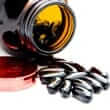Background
- Beta-alanine is a beta-amino acid that differs structurally from most amino acids found in the diet. In the body, beta-alanine forms part of the structure of vitamin B5, carnosine, and dihydrouracil. In the diet, beta-alanine is found mostly in meat, such as chicken, beef, pork, and fish.
- Beta-alanine is thought to enhance exercise performance, mainly for activities that require power or strength, such as sprinting or weight lifting. Human studies have shown that beta-alanine may increase time to exhaustion, peak power during running, and an increase in weight and number of repetitions for the bench press. However, more research is needed.
- Amounts of beta-alanine over 10 milligrams per kilogram of body weight may cause a feeling of "pins and needles." This feeling may go away after a few weeks of continuous use.
References
- Deldicque L and Francaux M. Functional food for exercise performance: fact or foe? Curr Opin.Clin Nutr Metab Care 2008;11(6):774-781. View Abstract
- Derave W, Ozdemir MS, Harris RC, et al. beta-Alanine supplementation augments muscle carnosine content and attenuates fatigue during repeated isokinetic contraction bouts in trained sprinters. J Appl.Physiol 2007;103(5):1736-1743. View Abstract
- Dunnett M and Harris RC. Influence of oral beta-alanine and L-histidine supplementation on the carnosine content of the gluteus medius. Equine Vet.J Suppl 1999;30:499-504. View Abstract
- Hill CA, Harris RC, Kim HJ, et al. Influence of beta-alanine supplementation on skeletal muscle carnosine concentrations and high intensity cycling capacity. Amino.Acids 2007;32(2):225-233. View Abstract
- Hoffman JR, Ratamess NA, Faigenbaum AD, at al. Short-duration beta-alanine supplementation increases training volume and reduces subjective feelings of fatigue in college football players. Nutr Res 2008;28(1):31-35. View Abstract
- Hoffman J, Ratamess NA, Ross R, et al. Beta-alanine and the hormonal response to exercise. Int J Sports Med 2008;29(12):952-958. View Abstract
- Kendrick IP, Harris RC, Kim HJ, et al. The effects of 10 weeks of resistance training combined with beta-alanine supplementation on whole body strength, force production, muscular endurance and body composition. Amino.Acids 2008;34(4):547-554. View Abstract
- Kendrick IP, Kim HJ, Harris RC, et al. The effect of 4 weeks beta-alanine supplementation and isokinetic training on carnosine concentrations in type I and II human skeletal muscle fibres. Eur J Appl.Physiol 2009;106(1):131-138. View Abstract
- Stellingwerff T, Boit MK, and Res PT. Nutritional strategies to optimize training and racing in middle-distance athletes. J Sports Sci 2007;25 Suppl 1:S17-S28. View Abstract
- Stout JR, Cramer JT, Mielke M, et al. Effects of twenty-eight days of beta-alanine and creatine monohydrate supplementation on the physical working capacity at neuromuscular fatigue threshold. J Strength Cond.Res 2006;20(4):928-931. View Abstract
- Stout JR, Cramer JT, Zoeller RF, et al. Effects of beta-alanine supplementation on the onset of neuromuscular fatigue and ventilatory threshold in women. Amino.Acids 2007;32(3):381-386. View Abstract
- Stout JR, Graves BS, Smith AE, et al. The effect of beta-alanine supplementation on neuromuscular fatigue in elderly (55-92 Years): a double-blind randomized study. J Int Soc Sports Nutr 2008;5:21. View Abstract
- Tipton KD, Jeukendrup AE, and Hespel P. Nutrition for the sprinter. J Sports Sci 2007;25 Suppl 1:S5-15. View Abstract
- Van Gennip AH, Abeling NG, Vreken P, et al. Inborn errors of pyrimidine degradation: clinical, biochemical and molecular aspects. J Inherit.Metab Dis 1997;20(2):203-213. View Abstract
- Van Thienen R, Van Proeyen K, Vanden Eynde B, et al. Beta-alanine improves sprint performance in endurance cycling. Med Sci Sports Exerc 2009;41(4):898-903. View Abstract







